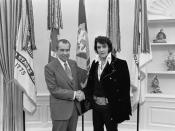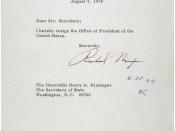In this case, the court is asked to decide if the president had knowledgeinvolvement in the Watergate robberies and if he had the right to invoke Executive Privilege.
Facts
During the campaign of President Nixon's second term, a group of burglars working for the committee to re-elect the President broke into the headquarters of the Democratic National Committee at the Watergate office-apartment complex in Washington DC, apparently in search of political intelligence. Attempts by the White House to stop or frustrate the ensuing investigations ultimately failed when Nixon's own White House tape recordings revealed that the president and his assistants had engaged in an obstruction of justice.
Following the arrest of the two co-plotters--G. Gordon Liddy and E. Howard Hunt-- District Court Judge John J. Sirica was convinced that pertinent details had not been unveiled during the trial and proffered leniency in exchange for further information. It became increasingly evident that the Watergate burglars were tied closely to the CIA and the Committee to Re-elect the President, some of Nixon's aides began talking to federal prosecutors.
Due to the defection of these aides, the Senate established, in February of 1973, an investigative committee held by Senator Sam Ervin, Jr., to look into the growing scandal. Amid the disclosures of White House involvement in the Watergate break-in and its aftermath, Nixon announced the resignation of two of his closest advisors and the dismissal of his counsel John W. Dean III. Dean told the Ervin committee in June that Nixon had known of the cover-up. A month later, former White House staff member Alexander Butterfield revealed that Nixon had secretly tape-recorded conversations in his offices. The special prosecutor Cox, and the Ervin committee attempted to obtain such tapes but the president cited Executive Privilege, and refused to relinquish them...


